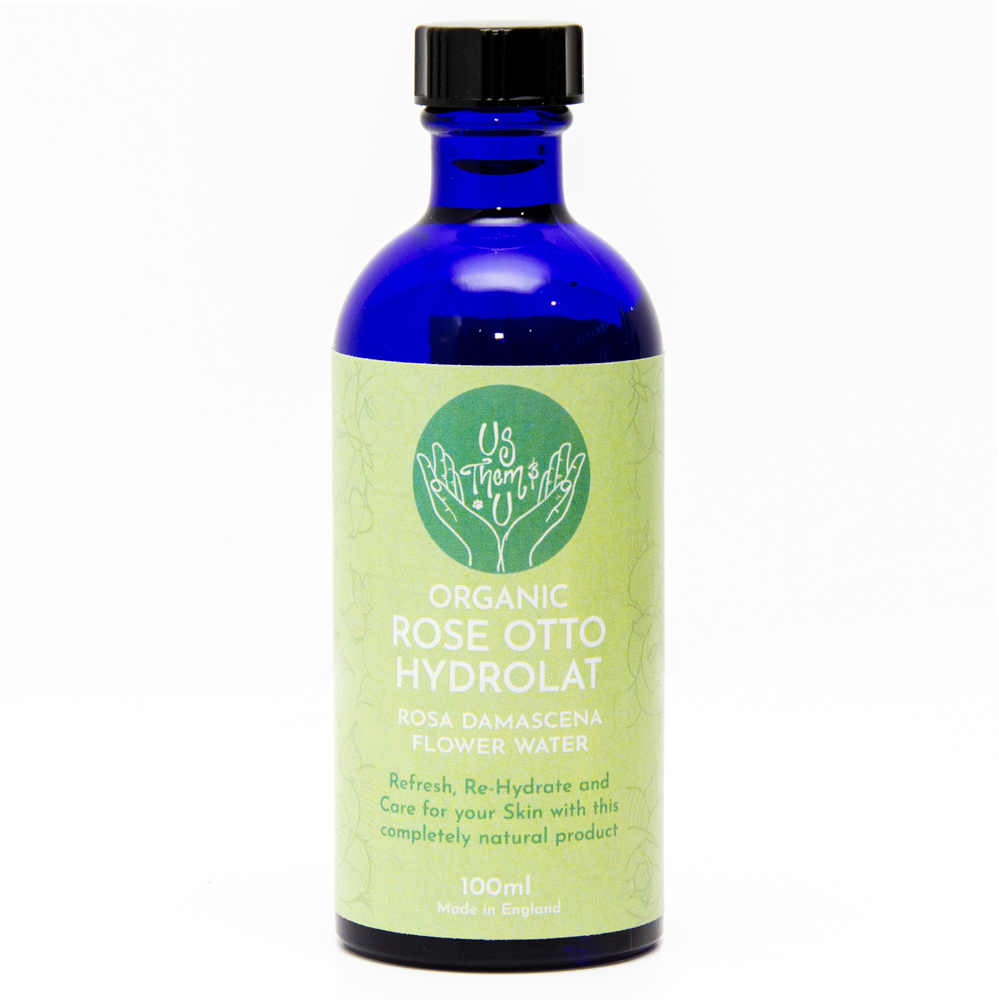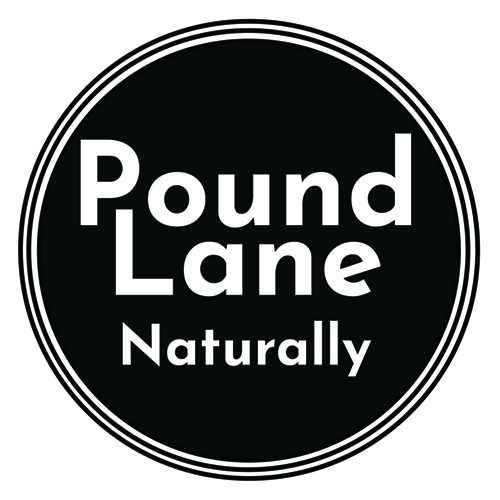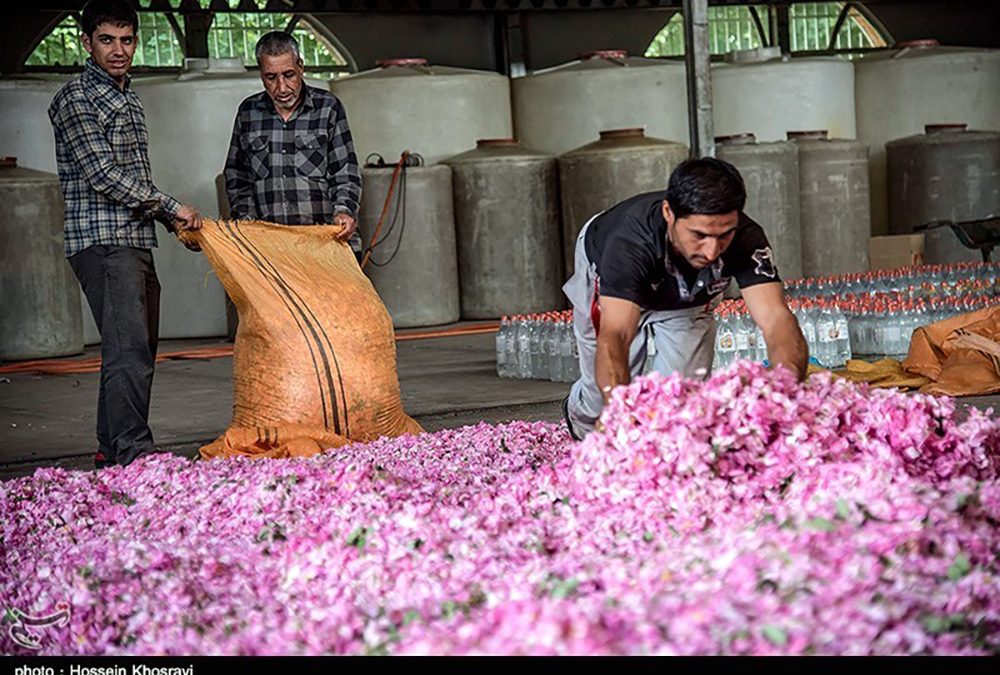What are hydrolats, hydrosols, floral waters, distillates, and aromatic waters?
These were generally the by product of the distillation process to produce essential oils, but are now used more widely and many are purpose produced. True hydrolats contain micronized droplets of essential oils suspended in the water and are very different from water which has had essential oil and a dispersant added. This causes some confusion as ‘floral waters’ may conjure up in the mind something which smells sweet or floral and this is not always the case. Indeed many true hydrolats do not smell like the plant they originally came from or the essential oil which may arise from the distillation of such a plant. However true rosewater (hydrolat) does smell fantastic.
Their smell can be pungent and earthy, but not unpleasant. Some hydrolats are completely devoid of smell due to the minuscule proportions of aromatic compounds present and still others smell quite musty. The lack of aroma, however, in either the plant or the hydrosol does not detract from the sometimes very useful therapeutic properties.
Pure Rose Otto Hydrolats smell absolutely wonderful and it is suitable for all skin types. It is known to have been valued for centuries by many cultures for its profound healing properties on both a physical and psychological level. It is gently cleansing. It will help maintain the pH balance and stimulate regeneration processes. Rose Otto Hydrolat is not sticky, has a wonderful cooling effect, is naturally toning, nourishing, hydrating and Is used extensively in perfumes and as an emollient in skin care products
This product is a true hydrolat, which are mainly water they are gentle and safe to use; they are easily applied and absorbed.
However time spent researching “rosewater” will reveal many different explanations of how it is originated, what constitutes true rosewater and the price that it is sold at. Some retail companies even claim that they distil it themselves and that they only distil for the production of rosewater (so they throw away essential oil worth thousands of pounds). Some companies advertise it as “pure” then in the ingredients list clearly show that they have added stabilisers etc, or worse still have actually manufactured the water by mixing essential oil, water and alcohol. As ever marketing departments will be very clever with words and you are left to decide what the reality is.
The price you are asked to pay for “Rosewater” varies dramatically as with other products and the old adage applies if it seems to cheap or expensive then there is usually a very good reason for that. As an example I have found “rosewater” selling for £44 for 100ml.
Rose water’s history traces back to Persia (modern-day Iran), where it’s known as gulāb (گلاب), meaning “rose water” in Persian. The process of steam distillation, refining the creation of rose water, was developed by Persian and Arab chemists in the medieval Islamic world, leading to its use in perfume and other industries. The practice of using rose water for medicinal, cosmetic, and culinary purposes dates back centuries, with early recipes appearing in the Middle East between the 8th and 11th centuries.
Here’s a more detailed look at the history:
-
Ancient Origins: While the ancient Romans infused wine with rose petals, the steam distillation method for producing rose water is rooted in ancient Persia.
-
Persian Refinement: Scholars and physicians in Persia (modern-day Iran) documented the distillation process as early as the 9th century Persian polymath Ibn Sina (Avicenna) is credited with creating rose water in the 10th century through hydro-distillation.
-
Middle Eastern Popularity: Rose water gained immense popularity in the Middle East, particularly during the early Middle Ages. It was used not only in desserts but also for medicinal purposes, religious ceremonies, and even dentistry.
-
The Crusades and European Introduction: The Crusades introduced rose water to Europe, where it became a luxury item among the aristocracy.
-
Culinary Uses: The Persians were among the first to explore the culinary potential of rose water, infusing it into mutton fat for seasoning. Rose water is still a cherished ingredient in Middle Eastern, Asian, and Mediterranean cuisines today.
-
Global Spread: Rose water’s use spread to various parts of the world, including the United States, where it was widely used in the 18th and early 19th centuries, as evidenced by the first U.S. cookbook, “American Cookery,” by Amelia Simmons.
-
Cultural Significance: In Islam, rose water is used in religious ceremonies, including cleansing rituals, and the Holy Kaaba in Mecca is washed with Qamsar rose water during the Hajj and Ramadan.
-
Modern Uses: While vanilla has replaced rose water in many U.S. home kitchens, rose water is experiencing a revival and is widely available worldwide, used in various applications like beauty products and even in culinary creations like French rose macarons and Turkish Delight.
AI generated text
Suggestions on how to use Rose Otto Hydrolat
Cooling spray
Put it into an atomiser and spray on the face or body, to refresh and cool, especially when travelling. If you keep the Rosewater in the fridge it will be even more refreshing
Skin treatments
Hydrolats make great toners and cleansers, also great for the treatment of spots or sores, new piercing and cuts and grazes. They are powerful yet gentle enough to use on sensitive areas and children and babies sensitive skin
Eye Problems
For sty’s, and minor eye infections gently wipe the area with Rosewater on a cotton wool pad.
This also works well on your furry friends eyes.
After shave
hydrolats help with shaving rash and prevention of in grown hairs
Lotions and Creams
This Rose Otto Hydrolat can be used to make lotions and creams and also added to ready made. Also can be used as a hair rinse.
Laundry
If you buy it in large quantities you may use it to spray your sheets just before bed time, put it inside your iron and your ironed clothes smell wonderful.
Food
Rosewater can be used in cooking to add a subtle floral flavour and aroma to both sweet and savoury dishes, especially in Middle Eastern, Indian, and Asian cuisines. It is commonly used in desserts like cakes, puddings, ice cream, and pastries, as well as in some savoury dishes like biryani.
Here are some recipes using Rosewater https://www.bbc.co.uk/food/rosewater
Rose Otto Hydrolat
- Is not sticky
- Has a wonderful cooling effect
- Is naturally toning
- Is nourishing
- Is hydrating
- Is used extensively in perfumes and as an emollient in skin care products
- Is used to flavour food – Turkish Delight in particular

The Rose Otto Hydrolat sold by Us Them and U is Organic and is produced in Bulgaria in the valley of Roses. It is one of the best Rosewaters you can buy.

